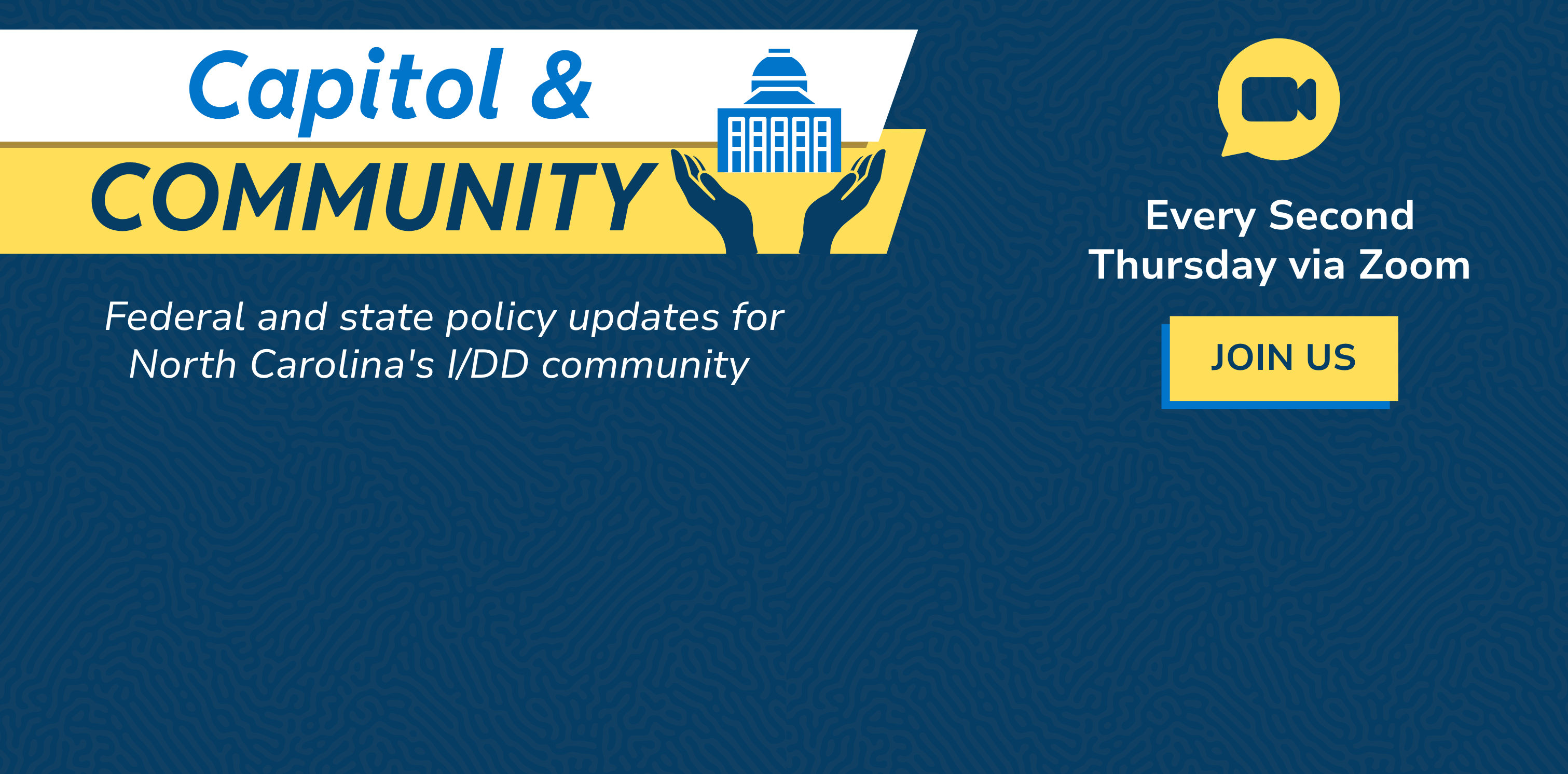
STATE UPDATE (Accurate as of 07/15/2020)
The official end to the legislative short session is July 11, but the NC General Assembly completed the majority of their work on June 27. A small number of legislators remained until July 11 to deal with any vetoes from the Governor. The NC General Assembly is expected to reconvene on September 2 to review revenue numbers, make any needed adjustments, and allocate any additional federal COVID funds.
As expected, a series of mini-budgets were passed to address funding for Medicaid, Health and Human Services, Education and other areas of government. Federal COVID funds were also allocated.
Below are bills that we have been monitoring and reporting on during the session:
PASSED:
H1169 – Bipartisan Election Act of 2020 – addresses the ability to vote by absentee ballot. By requiring only one witness signature and allowing for an online ballot request process, it is intended to make voting easier as we head into election season in the midst of the COVID-19 pandemic. It also contains amendments that would allow the use of other government funded identification in addition to a DMV issued ID. These amendments would apply if a photo ID is required to vote in the future. A photo ID is not required for the November election.
S476 – School Based Mental Health - requires the state board of education to adopt a school-based mental health policy and to require K-12 school units to adopt and to implement a school-based mental health plan that includes a mental health training program and a suicide risk referral protocol.
S808 – Medicaid Funding Act – includes appropriations for several purposes including funds for moving DHHS offices from the Dix Campus (removing the requirement that DHHS move to Granville County), COVID relief funds for behavioral health and crisis services ($50 million to address budget shortfall), funds for Medicaid, and Medicaid Transformation reserve funds.* This bill also makes changes to the methods related to medicaid savings in LME/MCOs giving DHHS oversight for the use of savings generated by the LME/MCOs. It also delays implementation of the Standard Plan to July 2021.
H1023 – Coronavirus Relief Funds – includes numerous allocations including $5 million to Division of MHDDSA for 122C group homes that serve people with intellectual and/or developmental disabilities for implementation of Centers for Disease Control and Prevention guidance for preventive measures to control the spread of COVID-19 in these facilities. This bill also allocates $5 million to Dept of Public Instruction for grants to schools to address critical needs for Exceptional children whose services were affected by COVID.
H77 – Adjust the Department of Transportation Certified Budget – makes several modifications related to operations of the Department of Transportation. One of the modifications was to the Rural Operating Assistance Program (ROAP) that funds transportation in rural areas for elderly people and people with disabilities. The original budget included over $18 million and this was reduced to zero and replaced with $10 million from federal COVID funds. There was significant concern expressed from the DD community about this reduction in funds and its potential impact on needed transportation, but the bill ultimately passed. We will need to continue to educate about the potential impact of this cut. There may be an opportunity to revisit this in the September session.
PASSED – but Vetoed by Governor
S168 DHHS & Revisions – contains a large number of changes to state law including a developmental disability definition correction to align NC statutes with the federal definition, state-funded services co-payment clarifying language, and authorization for federal block grant funding. The bill also included an amendment added during the conference committee process that public records experts believe would limit public information on death records. There has been significant concern and protest about this amendment. For that reason, the bill was vetoed by the Governor. There were efforts by the House to address the block grant funding but the bill was not taken up in the Senate. The I/DD definition correction, the language around co-payments, and the block grant funding allocations are important to address in September.
DID NOT PASS:
H1149 - Police Notice of Person w/ IDD in Vehicle – directed the Division of Motor Vehicles to develop a designation for drivers’ licenses that may be granted upon request to a person with IDD. There were significant concerns about having this information stored within the DMV database with potential for discrimination in renewal of licenses.
H488 - Address Direct Support Professional Staffing Crisis – would have addressed rates paid to Intermediate Care Facilities to address the lack of a comparable increase to rates paid for similar state facilities and to help address the shortage of direct support professionals in facility-based IDD services. The bill also contained a study for similar Direct Support Professional shortages and rate issues in community-based Innovations waiver services.
H1181 - Certain Appropriations For Education/COVID – would have allocated funds to educational entities to address issues related to COVID 19. It included $25 million to the Department of Public Instruction for grants to public schools to address COVID related costs for students with disabilities.
H1196 - Funds/COVID-19 Tests & PPE for Congregate Living – would have allocated $12 million from the Coronavirus Relief Funds to conduct testing for staff in congregate living settings and distribute Personal Protective Equipment to congregate living settings.
H1173 – Disapprove Certain DHHS Rules – this bill proposed to disapprove a list of rules that have already been approved by the Rules Review Commission. One of the rules was related to screening and care for people with I/DD in jail settings, which is a set of rules that has been vetted and approved by several I/DD entities and seen as a positive step in addressing issues in jails. There was significant opposition to this bill in the I/DD community. We are glad the rules for jail settings can be implemented.
S730 – No Patient Left Alone Act – addressed the visitation rights of hospital patients to have someone present while receiving hospital care. This bill was modified several times during the legislative process and amendments were added that included funding for UNC for contact tracing and funding for small businesses. The Senate did not agree with the changes made by the House so the bill was not approved.
* There were funds allocated to DHHS for Medicaid, for Medicaid transformation, for LME/MCOS to address budget shortfalls, and for I/DD group homes to address COVID-19; yet, the huge waitlist for I/DD services was not addressed in any of the mini-budgets during this session.
FEDERAL UPDATE
Both the House and Senate are now in recess and will return on July 20. When they return, they are expected to act on a fourth COVID-19 relief package. As a reminder, the House passed the HEROES Act which was a massive $3 trillion proposal, even more ambitious than the $2.2 trillion CARES Act. This relief legislation promises a second stimulus check, debt relief, student loan forgiveness, hazard pay, six more months of COVID-19 unemployment, housing and food assistance, and nearly $1 trillion in aid for state and local governments so they can pay “vital workers like first responders, health workers, and teachers” who are at risk of losing their jobs due to budget shortfalls. It also included increases for Home and Community Based Services. The Senate did not take this up before the recess. Before recess, Congress did extend the Paycheck Protection Program through August. The additional $600 for unemployment benefits is set to expire at the end of July, just two weeks after legislators return.
Also before recess, we saw some Senators come forward who want to give money to organizations that support people with disabilities. A group of Democratic Senators sent a letter to Majority Leader McConnell and Minority Leader Schumer requesting $30 million be included in the next COVID-19 Package for the Developmental Disabilities Network, and calling for the funds to be divided equally among the State Councils on Developmental Disabilities (CDD or Councils), the University Centers for Excellence in Developmental Disabilities (UCEDDs), and the Protection and Advocacy (P&A) programs. The task comes in response to the disproportionate effect the pandemic is having on the disability community and recognizes the unique capabilities of the network to address the growing needs of individuals with developmental and other disabilities.
For the next COVID package, I/DD advocacy groups are continuing to ask Congress to prioritize funds for Home and Community Based Services to meet the emergency needs of people with disabilities living in the community. Other areas we would like to see directly addressed in the next legislation include:
- Identification of direct support professionals as essential workers so they would be eligible for any increased wages or benefits in the next legislation
- Access to Personal Protective Equipment for direct support professionals
- Ensure that any incentive payments include all people with disabilities, including those who are claimed as dependents.
Fiscal Year 2021 – Congress has started working on next year's budgets for the government. The House Appropriations Committee released a fiscal year 2021 (FY21) funding bill for Labor, Health and Human Services, Education, and other related agencies. The bill, which increases overall funding by $2.4 billion above the fiscal year 2020 level, stands in direct contrast to President Trump's significantly smaller budget request. Highlights of the bill particularly relevant to people with disabilities include increases in funding for programs to improve maternal and child health, Medicare and Medicaid services, Home and Community-Based Supportive Services (HCBS), and Special Education.
Recent Posts
The North Carolina Council on Developmental Disabilities (NCCDD) is deeply…






